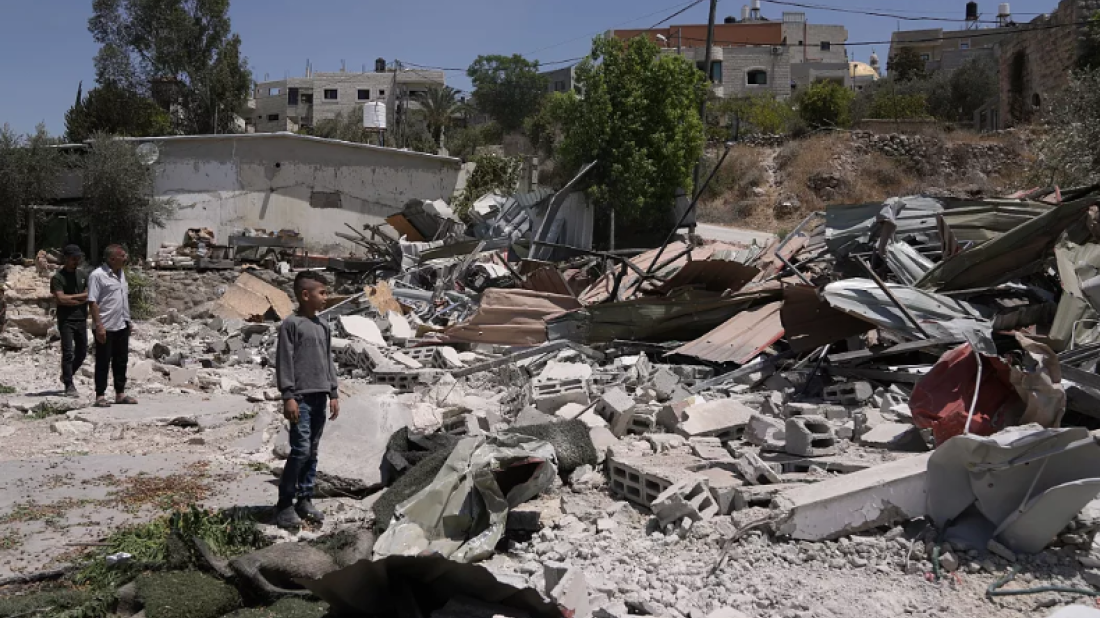Russian strikes hit Ukraine as peace talks take place in Abu Dhabi
Russian drone and missile strikes overnight killed at least one person and left millions without electricity and heating during freezing winter temper...

Israel has given final approval for a highly controversial settlement project in the occupied West Bank, a move that critics say would effectively sever the territory and deal a severe blow to the prospects of a future Palestinian state.
The project concerns E1, a strategic tract of land east of Jerusalem. Plans for development there have been debated for over two decades but repeatedly stalled under U.S. pressure. The Israeli occupation of Palestinian territories is deemed illegal under international law, and in a landmark ruling last year, the International Court of Justice said Israel must end settlement activity in the West Bank and East Jerusalem, as well as its occupation of those areas and Gaza, without delay.
Finance Minister Bezalel Smotrich, a far-right politician and former settler leader, hailed the decision as a direct response to recent European announcements of support for Palestinian statehood. “The Palestinian state is being erased from the table not with slogans but with actions,” he declared. “Every settlement, every neighbourhood, every housing unit is another nail in the coffin of this dangerous idea.”
The move drew sharp international criticism. British Foreign Secretary David Lammy described it on X as “a flagrant breach of international law,” while German Foreign Ministry spokesperson Josef Hinterseher said Berlin “strongly rejects this approval” and stressed that settlement expansion violates international law and UN Security Council resolutions.
The location of E1 is considered pivotal, as it lies between Ramallah in the north and Bethlehem in the south. The two cities are only 22 kilometres apart, but Palestinians must currently take long detours and navigate multiple checkpoints to travel between them. In any eventual Palestinian state, E1 was expected to provide a direct link.
The settlement decision comes as the situation in the West Bank grows increasingly bleak, with a surge in settler violence, evictions, military raids, and restrictions on movement, even as the world’s attention remains fixed on the conflict in Gaza.
On Wednesday, the Israeli military announced it had begun the first stage of its long-planned offensive to seize Gaza City, the enclave’s largest urban centre. Brigadier General Effie Defrin said Israeli forces were now “holding the outskirts of Gaza City.”
Israel is also calling up 60,000 reservists, the largest mobilisation in months, as fighting intensifies and negotiators continue efforts to broker a ceasefire nearly two years into the war. The scale of the call-up carries major economic and political implications in a country of fewer than 10 million people.
U.S. Ambassador to Israel Mike Huckabee blamed recent European moves to recognise Palestinian statehood for undermining the Gaza ceasefire process. “The noise that has been made by European leaders recently ... is having the counterproductive effect that they probably think that they want,” he told the Associated Press.
The escalation follows mass demonstrations in Israel, where hundreds of thousands recently rallied in support of a ceasefire. Rights groups have warned that an expanded assault could deepen the humanitarian crisis in Gaza, where most of the enclave’s two million residents have been displaced, swathes of territory have been reduced to rubble, and famine looms.
Firefighters were clearing the charred ruins of a Karachi shopping mall in Pakistan on Tuesday (20 January) as they searched for people still missing after a fire that burned for nearly two days and killed at least 67 people, police said.
President Donald Trump said on Thursday that the United States has an "armada" heading toward Iran but hoped he would not have to use it, as he renewed warnings to Tehran against killing protesters or restarting its nuclear programme.
Turkish President Recep Tayyip Erdoğan has told his Iranian counterpart Masoud Pezeshkian that Türkiye opposes any form of foreign intervention in Iran, as protests and economic pressures continue to fuel tensions in the Islamic republic.
In the snowy peaks of Davos, where the world’s most powerful leaders gather for the 56th World Economic Forum, a new narrative is emerging that challenges the current dominance of artificial intelligence (AI).
Trilateral negotiations between Ukraine, Russia and the U.S. entered a second day in Abu Dhabi on Saturday, following an initial round of talks described by officials as productive.
U.S. President Donald Trump thanked Azerbaijan and Armenia for upholding last August’s peace deal and said Vice President J.D. Vance will visit both countries in February.
An international photography exhibition by world-renowned photojournalist Reza Deghati, known globally as REZA, is offering travellers a powerful visual introduction to Azerbaijan at Heydar Aliyev International Airport.
Trade turnover between Kyrgyzstan and Tajikistan reached $33.4m in 2025, almost three times higher than the previous year, according to data from Tajikistan’s Customs Service.
The recent peace process between Armenia and Azerbaijan has reignited a sensitive debate in Georgia: does regional normalisation strengthen Georgia’s position or threaten its long-standing role as the South Caucasus’ key transit hub?
The claim that U.S. President Donald Trump's intervention stopped the execution of 800 detainees is "completely false", said prosecutor-general of Iran, Mohammad Movahedi on Friday (23 January). According to him, the number cited by Trump does not exist and the judiciary has made no such decision.
You can download the AnewZ application from Play Store and the App Store.

What is your opinion on this topic?
Leave the first comment